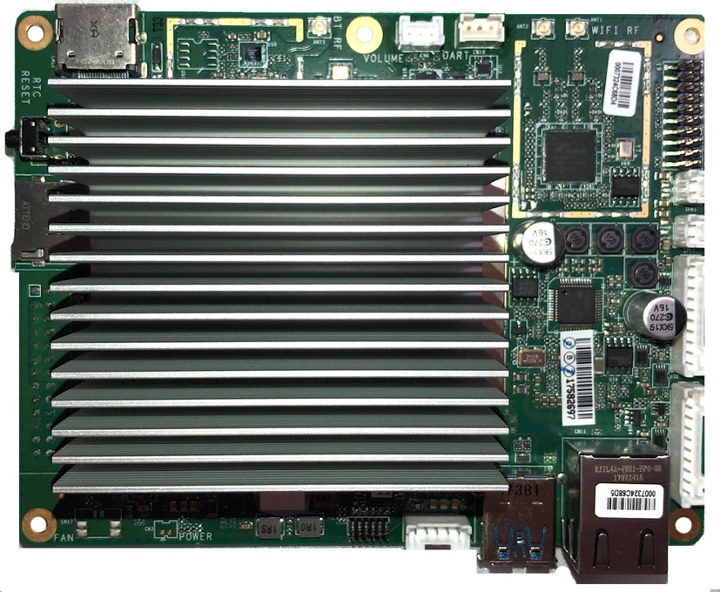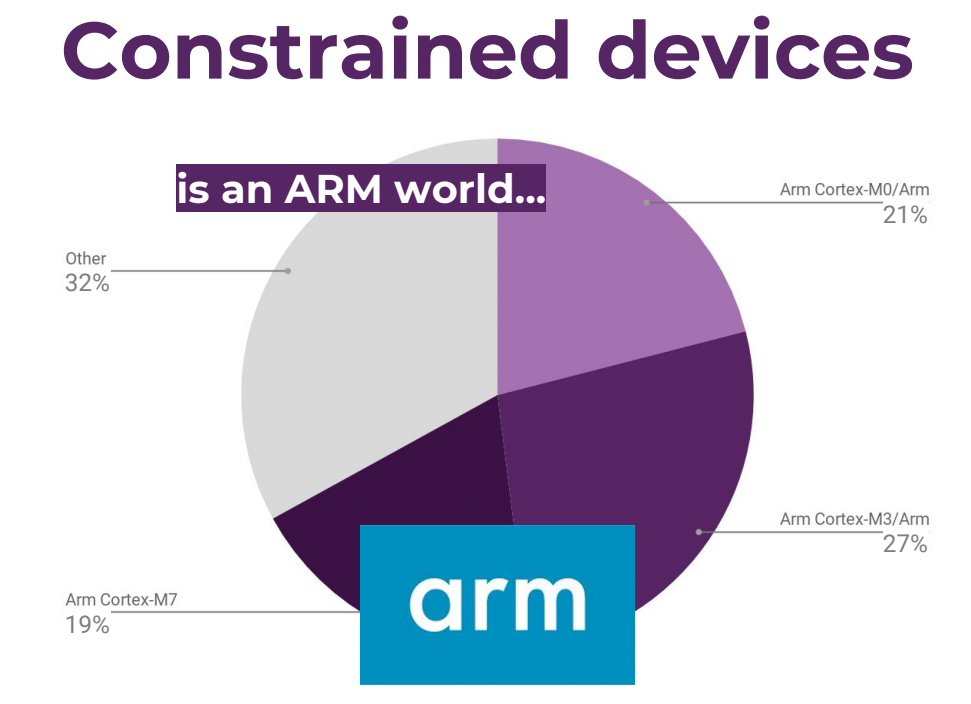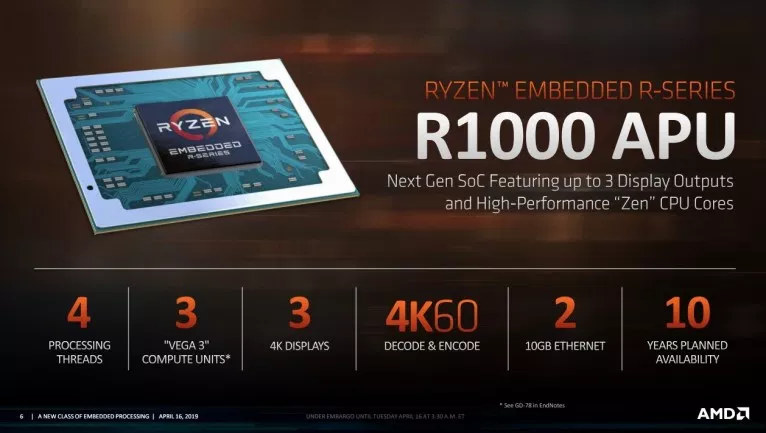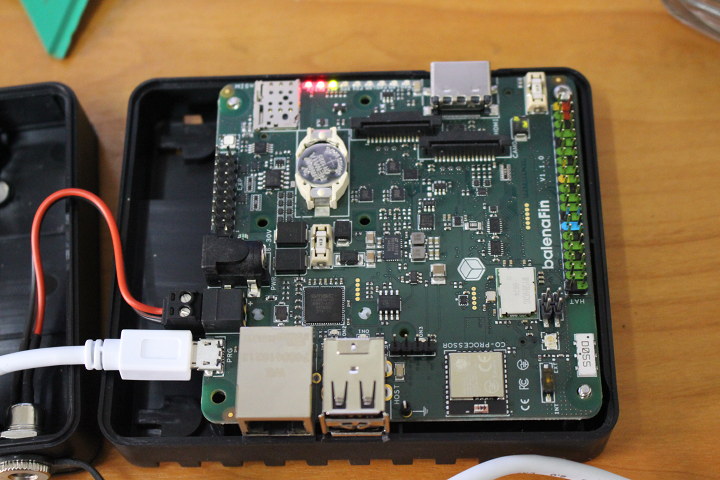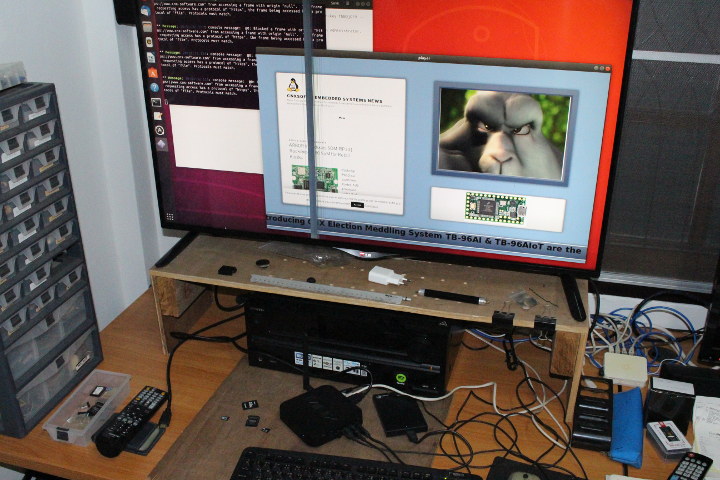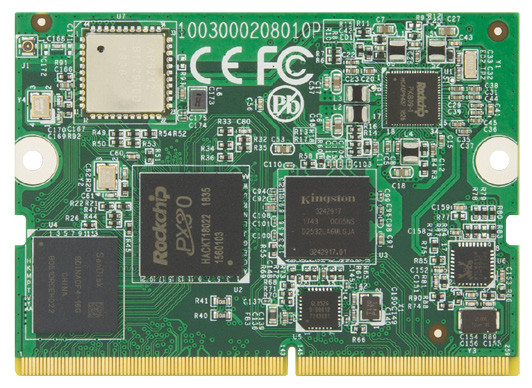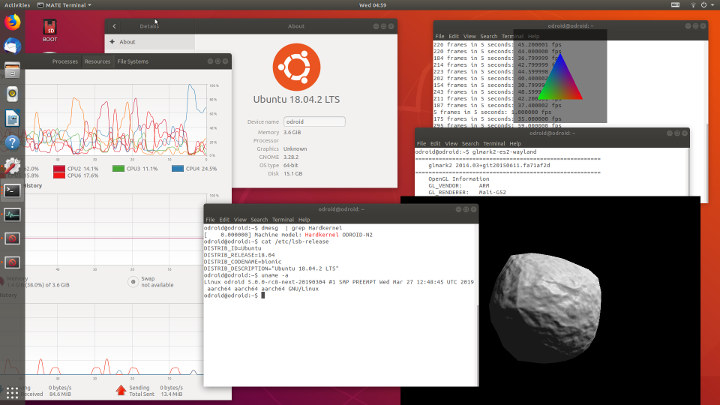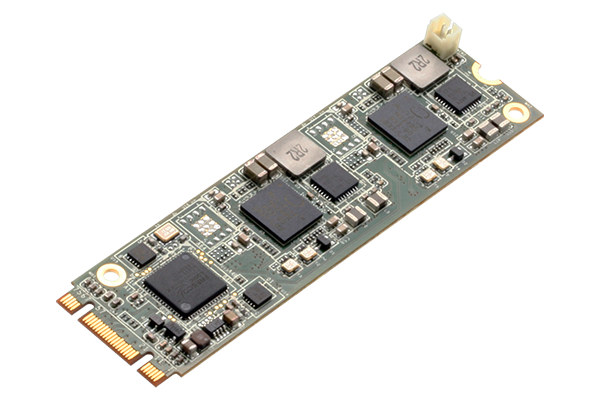At the very end of last year, I covered Atomic Pi single board computer powered by an Intel Atom x5-Z8350 processor which was mostly interesting because of its incredibly low price: $34 and up. Getting an Intel board fof the price of a Raspberry Pi looked too good to be true, and being launched via a Kickstarter, the crowdfunding campaign raised suspicions. The board would also only ship to the US. Shipping was scheduled for January 2019, backers received their board around two months ago, and most people appear to be satisfied with the main struggle being powering the board since it requires some manual wiring for people who did not purchase the breakout board. So it’s real, it works, and the good news is that the board now sells on Amazon US for $34.50 with the company (DLI – Digital Logger Inc.) shipping worldwide. Here’s a reminder of the […]
Eclipse IoT Survey Report Reveals Arm & Linux Dominate, Security Concerns
The Eclipse IoT Working Group has just released a report asking the global IoT developer community to share their perceptions, requirements, and priorities. And with over 1,700 individuals taking the survey between February and March 2019, the key findings are interesting: IoT drives real-world, commercial outcomes today. 65% of respondents are currently working on IoT projects professionally or will be in the next 18 months. IoT developers mostly use C, C++, Java, JavaScript, and Python AWS, Azure, and GCP are the leading IoT cloud platforms Top three industry focus areas remain the same as last year: IoT Platforms, Home Automation, and Industrial Automation / IIoT. MQTT remains the dominant IoT communication protocol leveraged by developers The Eclipse Desktop IDE is the leading IDE for building IoT applications The last point may be slightly biased because the survey was done by the Eclipse IoT Working Group, so most respondents were already […]
AMD Unveils Ryzen Embedded R1000 Dual Core Processors
Last year, AMD launched Ryzen Embedded V1000 series processor found in UDOO BOLT single board computer, industrial motherboards, and rugged mini PCs. The company has now introduced their second Ryzen Embedded processor family with AMD Ryzen Embedded R1000 SoC based on the same Zen cores, and offering 3x the performance per watt against the previous AMD R-Series SoC, and 4x the performance per dollar compared to a system based on an Intel Core i3-7100U Kaby Lake processor. AMD Ryzen Embedded R1000 processors all come with two cores / four thread configuration, 1MB L2 cache, 4MB L3 cache, VEGA 3 graphics, support for three 4K displays, 4K60 video decode & encode, dual 10Gbit Ethernet, and a TDP configurable between 12W and 25W. Two Ryzen Embedded R1000 processors have been announced so far: Ryzen Embedded R1606G with 2.6 GHz base frequency, 3.5 GHz one-thread boost frequency, and 1.2 GHz GPU Ryzen Embedded […]
Getting Started with balenaFin Developer Kit, balenaOS and balenaCloud
balena Fin is a carrier board for Raspberry Pi Compute Module 3/3+ designed specifically for industrial applications leveraging fleet management services provided by Balena. I received balenaFin developer kit last month, and in the first part of the reviewed shows how to assemble the kit. I’m now had time to spend more time with the kit, as well as BalenaOS Linux based operating system optimized for running Docker containers on embedded devices, and balenaCloud services to manage a fleet of devices from a web dashboard. I’ve mostly followed the instructions in the getting started guides here and there, and will document what I had to do to prepare the image, flash it to the board, and load a sample docker application locally, and through balenaCloud. Downloading and Configuring BalenaOS for balena Fin You’ll find BalenaOS in the download page. While we are using hardware based on a Raspberry Pi Compute […]
MINIX NEO Z83-4U Review – Ubuntu 18.04, Kodi 18, and Xibo Digital Signage
MINIX NEO Z83-4U is a Cherry Trail mini PC pre-loaded with Ubuntu 18.04. I received a sample a little while ago, and in the first part of NEO Z83-4U review I checked out the specifications and hardware that appears to be exactly the same a MINIX NEO Z83-4 Pro mini PC, except for the eMMC flash capacity that has increased from 32GB to 64GB. Since the mini PC comes with an older Atom X5-Z8350 processor, and is designed for commercial applications, I’ve decided to make a slightly different review. We already now how the system is supposed to perform thanks to benchmarks with NEO Z83-4 mini PC running Windows 10 Pro, so I’ll just check the main features are working as expected in Ubuntu 18.04, test audio & video support in Kodi 18.1, and try out Xibo Linux open source digital signage CMS and player on the mini PC. MINIX […]
ARBOR Introduces SOM-RP301 Rockchip PX30 SoM for Retail Kiosks
Rockchip PX30 is a quad core Cortex-A35 processor with a dual VOP (Video Output Processor) in order to drive two independent displays, that has low power consumption, low thermal requirements, and that we previously found in some car infotainment systems. But the processor is also suitable for other applications, and ARBOR Technology recently launched SOM-RP301 system-on-module based on the PX30 processor, and specifically designed for fanless retail kiosks such as electronic restaurant menus, automated currency exchange machines, ticketing kiosks and more. SOM-RP301 system-on-module specifications: SoC – Rockchip PX30 quad core Cortex-A35 processor @ 1.5 GHz with Arm Mali-G31 MP2 GPU System Memory – 1GB LPDDR3 (Up to 4GB as option) Storage – 16 GB eMMC flash Connectivity – Fast Ethernet transceiver, 802.11 b/g/n/ac WiFi 5 + Bluetooth 4.0 module Edge Connector – SO-DIMM connector with Display – LVDS or MIPI DSI Camera – MIPI CSI RX interface with 8MP ISP […]
ODROID-N2 GPU Drivers, Linux 5.0, and Impressive glmarks-es2 Score
ODROID-N2 was announced last February for $63 (2GB RAM), and $79 (4GB RAM), but Hardkernel was not quite ready to take orders at the time. One of the good news is that the 4GB RAM is now available for pre-order with shipping scheduled to start on April 3. Another good news is on the software side with Hardkernel having released the userland Mali-G52 Wayland driver. It does not work well with Linux 4.9 due to incomplete DRM implementation, but it goes work with Linux 5.0 plus some modifications as further discussed in the aforelinked forum thread. The screenshot above, courtesy of odroid forum member memeka , shows ODROID-N2 running Ubuntu 18.04 + Gnome3 + Linux 5.0 on top of Wayland with GPU drivers providing acceleration as shown by glmark2-es2-wayland test program. The benchmark results are pretty impressive:
|
1 2 3 4 5 6 7 8 9 10 11 12 13 14 15 16 17 18 19 20 21 22 23 24 25 26 27 28 29 30 31 32 33 34 35 36 37 38 39 40 41 42 43 44 |
======================================================= glmark2 2014.03+git20150611.fa71af2d ======================================================= OpenGL Information GL_VENDOR: ARM GL_RENDERER: Mali-G52 GL_VERSION: OpenGL ES 3.2 v1.r16p0-01rel0.2943fc4ef9657d91ee32c9a58dec6cd2 ======================================================= [build] use-vbo=false: FPS: 961 FrameTime: 1.041 ms [build] use-vbo=true: FPS: 1592 FrameTime: 0.628 ms [texture] texture-filter=nearest: FPS: 1491 FrameTime: 0.671 ms [texture] texture-filter=linear: FPS: 1477 FrameTime: 0.677 ms [texture] texture-filter=mipmap: FPS: 1524 FrameTime: 0.656 ms [shading] shading=gouraud: FPS: 1151 FrameTime: 0.869 ms [shading] shading=blinn-phong-inf: FPS: 1215 FrameTime: 0.823 ms [shading] shading=phong: FPS: 1043 FrameTime: 0.959 ms [shading] shading=cel: FPS: 1126 FrameTime: 0.888 ms [bump] bump-render=high-poly: FPS: 514 FrameTime: 1.946 ms [bump] bump-render=normals: FPS: 1976 FrameTime: 0.506 ms [bump] bump-render=height: FPS: 1777 FrameTime: 0.563 ms [effect2d] kernel=0,1,0;1,-4,1;0,1,0;: FPS: 1139 FrameTime: 0.878 ms [effect2d] kernel=1,1,1,1,1;1,1,1,1,1;1,1,1,1,1;: FPS: 383 FrameTime: 2.611 ms [pulsar] light=false:quads=5:texture=false: FPS: 2096 FrameTime: 0.477 ms [desktop] blur-radius=5:effect=blur:passes=1:separable=true:windows=4: FPS: 389 FrameTime: 2.571 ms [desktop] effect=shadow:windows=4: FPS: 788 FrameTime: 1.269 ms [buffer] columns=200:interleave=false:update-dispersion=0.9:update-fraction=0.5:update-method=map: FPS: 103 FrameTime: 9.709 ms [buffer] columns=200:interleave=false:update-dispersion=0.9:update-fraction=0.5:update-method=subdata: FPS: 129 FrameTime: 7.752 ms [buffer] columns=200:interleave=true:update-dispersion=0.9:update-fraction=0.5:update-method=map: FPS: 158 FrameTime: 6.329 ms [ideas] speed=duration: FPS: 356 FrameTime: 2.809 ms [jellyfish] <default>: FPS: 979 FrameTime: 1.021 ms [terrain] <default>: FPS: 52 FrameTime: 19.231 ms [shadow] <default>: FPS: 437 FrameTime: 2.288 ms [refract] <default>: FPS: 88 FrameTime: 11.364 ms [conditionals] fragment-steps=0:vertex-steps=0: FPS: 1769 FrameTime: 0.565 ms [conditionals] fragment-steps=5:vertex-steps=0: FPS: 1769 FrameTime: 0.565 ms [conditionals] fragment-steps=0:vertex-steps=5: FPS: 1853 FrameTime: 0.540 ms [function] fragment-complexity=low:fragment-steps=5: FPS: 1783 FrameTime: 0.561 ms [function] fragment-complexity=medium:fragment-steps=5: FPS: 1726 FrameTime: 0.579 ms [loop] fragment-loop=false:fragment-steps=5:vertex-steps=5: FPS: 1715 FrameTime: 0.583 ms [loop] fragment-steps=5:fragment-uniform=false:vertex-steps=5: FPS: 1650 FrameTime: 0.606 ms [loop] fragment-steps=5:fragment-uniform=true:vertex-steps=5: FPS: 1728 FrameTime: 0.579 ms ======================================================= glmark2 Score: 1119 ======================================================= |
I’ve never seen such as high score (1,119 points) on Arm hardware. […]
AI Core XM2280 M.2 Card is Equipped with two Myriad X 2485 VPUs
AAEON released UP AI Core mPCIe card with a Myriad 2 VPU (Vision Processing Unit) last year. But the company also has an AI Core X family powered by the more powerful Myriad X VPU with the latest member being AI Core XM2280 M.2 card featuring not one, but two Myriad X 2485 VPUs coupled with 1GB LPDDR4 RAM (512MB x2). The card supports Intel OpenVINO toolkit v4 or greater, and is compatible with Tensorflow and Caffe AI frameworks. AI Core XM2280 M.2 specifications: VPU – 2x Intel Movidius Myriad X VPU, MA2485 System Memory – 2x 4Gbit LPDDR4 Host Interface – M.2 connector Dimensions – 80 x 22 mm (M.2 M+B key form factor) Certification – CE/FCC Class A Operating Temperature – 0~50°C Operating Humidity – 10%~80%RH, non-condensing The card works with Intel Vision Accelerator Design SW SDK available for Ubuntu 16.04, and Windows 10. Thanks to the two […]


